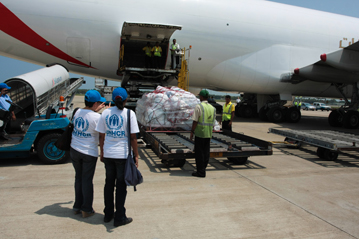A new home for Tripoli's refugees
A new home for Tripoli's refugees

TRIPOLI, Libya, December 4 (UNHCR) - After years spent living in a chaotic shelter smack in the centre of the Libyan capital without adequate space or proper sanitary conditions - where some disgruntled asylum seekers even went on hunger strike to seek attention - some 300 of Libya's neediest refugees have been shifted to a newly-christened facility in a nearby suburb.
Libya, now restoring air links and strengthening diplomatic ties with many Western countries, has long been a host to refugees in need.
The North African state's long adherence to Islam's traditions of providing shelter for people in need and zakat - the tenet that the rich must show charity towards the poor - have helped make Libya a welcome port for those in need of protection and assistance.
Somali refugees first began to arrive in Libya in 1990. They joined thousands of Palestinian refugees already in the country. Refugees from various war-torn African countries also began to reach the country alongside thousands of migrants seeking work. UNHCR now counts more than 11,600 people under its mandate in Libya.
Most of the refugees are integrated in Tripoli's sprawling suburbs, but some have not been able to make ends meet. Somalis made up the majority of the some 300 persons living for the better part of a decade in the ramshackle shelter in downtown Tripoli's Meidan El-Souahli neighbourhood. Aid workers described the now closed site as an auberge espagnole due to the building's modest facilities and the fact that its inhabitants mostly fended for themselves.
Within months, the refugee agency and the government identified a new site, an old compound in Tripoli's suburbs that was once used by workers for an Italian-owned firm. By late September, UNHCR, together with the government, began the process of relocating the group from the facility in Meidan El-Souahli.
While Libya is not yet a signatory of the 1951 refugee Convention, as a staunch member of the African Union the country adheres to the 1969 OAU Convention Governing Specific Aspects of Refugee Problems in Africa that provides generous rights and legal protection for African nationals seeking asylum.
The new compound, some 10 km from the centre of Tripoli, gives Somali and Congolese refugees proper shelter in the old homes of the Italian workers. The inhabitants also get a school and recreational space on the two-and-half-hectare site, where some of them operate little kiosks that sell food and drink, making especially brisk business during the iftar meal at the end of Ramadan's daytime fast. The Libyan Red Crescent oversees the facility's health centre and provides other assistance.
The co-operation of UNHCR and the Libyan authorities is indicative of increasing ties between the UN refugee agency and officials from Libya's relief community.
UNHCR was a beneficiary of support from Libya's civil society in late 2001, when the Gadaffi International Foundation for Charity Associations (GIFCA) contributed $752,000 for water drilling equipment, blankets, tents and shawls for Afghan refugees in Pakistan.
"It was a significant contribution and well regarded, as it was not extra or extravagant items, but goods that were much needed," said Radhouane Nouicer, the refugee agency's deputy director for North Africa and the Middle East.
Nouicer added that GIFCA recently pledged Euros 1.5 million to establish a trust fund to help refugees. The aid would be managed jointly by UNHCR, the International Committee of the Red Cross, GIFCA and The International Institute of Humanitarian Law at San Remo. GIFCA officials have also visited Yemen to examine the possibility of providing funds to help UNHCR's assistance programmes in that country.
The UN refugee agency's expanding co-operation with Libya relief authorities - both to solve practical problems like the shelter needs of its refugees, and to help meet the challenges faced by refugees further afield - is expected to help more refugees in the future. UNHCR has proposed that the Libyan government sign a memorandum of understanding to institutionalise the agency's presence in the country and provide a solid basis for its work in Libya.









